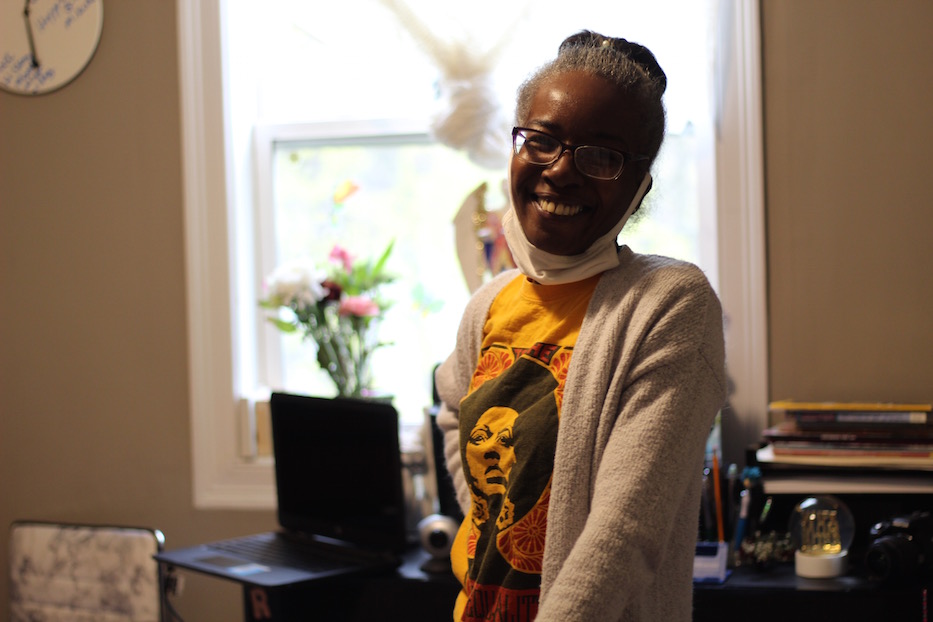
Black-owned businesses | Culture & Community | Arts & Culture | The Hill | Studio Visits | COVID-19
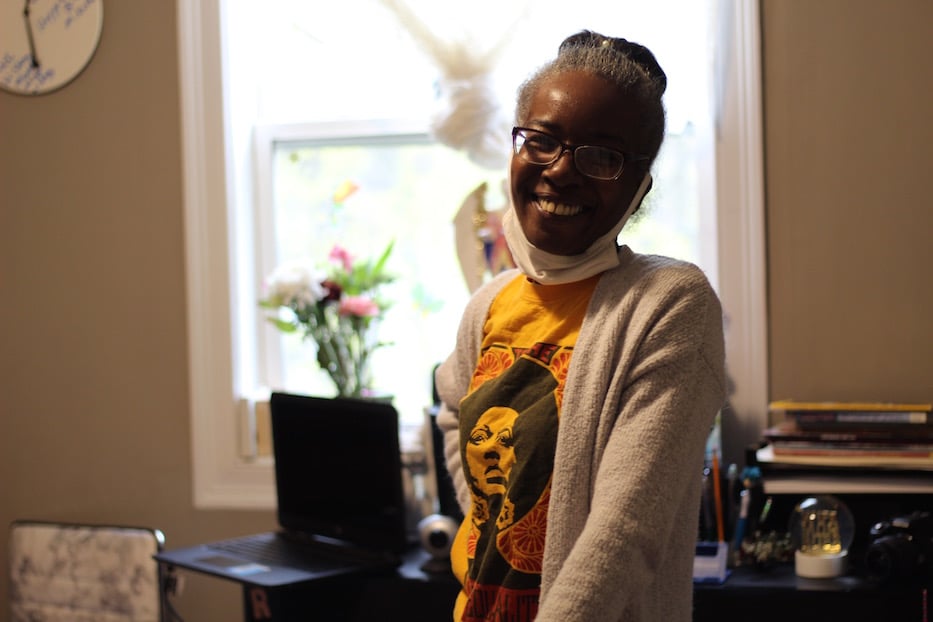
Tracey Massey in her upstairs studio. Lucy Gellman Photos.
Tracey Massey's upstairs studio on Arthur Street is small and neat, covered wall to wall with art. Newspaper clippings, year-old paintings and black and white photographs of old New Haven buildings greet the occasional visitor. Works in progress are propped up against the floor, table, and shelves. A vaccination card peeks out, crisp and white, near a collage of butterflies in flight.
Everywhere, there are reminders of friends and family members who have left the world—and everywhere, there are reminders of life.
Massey, who turned 49 on Monday, is on a mission to spread her artistic footprint across the city after years of raising four children and rediscovering the visual arts. After graduating from New Haven Adult & Continuing Education and starting a small boutique business, she wants to spend her next decades giving back to the community that raised her.
"I want my art to be an inspiration to other people,” she said in a recent interview at her home studio in the Hill. “Other artists, other people. You know, especially young people—and adults too—who just don't believe in their art or think that they're artists. You don't need anyone to tell you that you have a talent or gift."
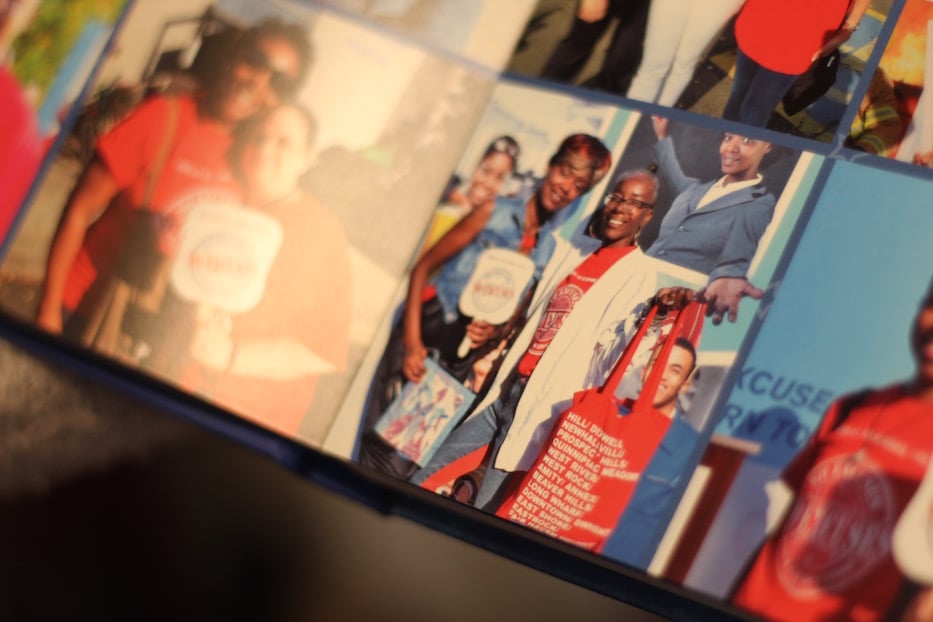
Massey has a photobook from a “No Excuses” march that Adult & Continuing Education students held in September 2019. She said that when she wants to think about the journey she's taken, she pulls it out.
Massey's dedication to the arts began decades ago in the city’s Newhallville and Dixwell neighborhoods. Born in New Jersey, she moved to New Haven in the early 1980s, when she was seven years old. Her mother and nine siblings lived on Winchester Avenue, and then moved to the Elm Haven projects, also known as the Ashmun High Rise/Low Rise.
As a student at the now-defunct Winchester School, she fell in love with learning, from weekly Friday spelling bees and weather reports to wet clay and pottery wheels in her art classes. Her music teacher, longtime education advocate Lydia Bornick, exposed her to Nina Simone. Her gym teacher, Ms. Sylvia Hare, would go out of her way to make sure students were completing assignments and getting the support that they needed at home.
The New Haven of her childhood was "so much about the village," she said. After school, Massey, her siblings and their friends went to the old Dixwell Community Q House and Dixwell Avenue UCC for dance and drum classes. After teachers took her to the Yale Repertory Theatre, she realized she wanted to be on the stage and began choreographing dances for school assemblies. One, set to Michael Jackson’s “Thriller,” was so popular that she still remembers performing it multiple times for the whole school.
"We had so much," she said, sifting through old report cards and photographs that she keeps in folders and boxes. "To me, you never wanted to grow up and you never wanted to leave New Haven. I thought New Haven was the best place in the world."
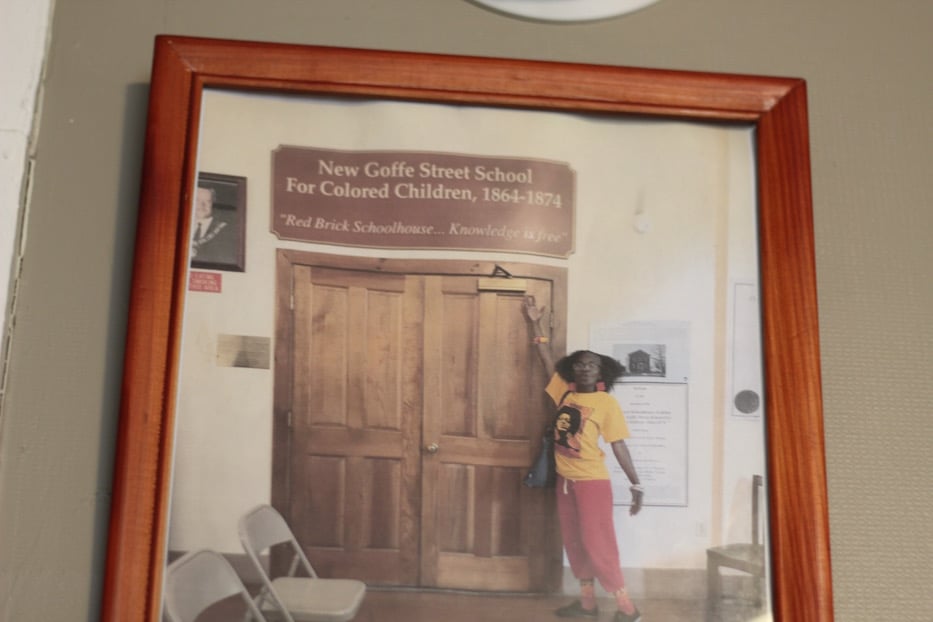
Massey said she is constantly inspired by New Haven's history. Years ago, she visited the former home of the Goffe Street Special School for Colored Children, hidden away at 106 Goffe St. She keeps a photo of the visit on her wall.
After fifth grade, her mother moved the family back to South Carolina, a small town with dirt roads called Conway, in an effort to protect her children from the crack epidemic that was ravaging New Haven. Massey had never seen the South before, and struggled with the move. Even years after Brown v. Board of Education, she said, de facto segregation remained the law of the land. She said she survived only thanks to the kindness of a few teachers who opened their classrooms.
"I didn't know until later on that it was because I was a little Black girl coming from the North," she said. "I didn't even know what the word Yankee meant. I would hear that term a lot. Oh, ‘she’s a Yankee, she’s a Yankee.’"
Massey stayed in South Carolina through high school. During the summers, she would visit her brother and aunts in New Haven, staying with them in the Church Street South Apartments. She was determined to get back to the city full time, she said.
But the path, which had once included college and a budding career in arts and music, wasn’t one she expected. When she was 17, she became pregnant with her first child. She left Conway for Myrtle Beach, and held onto the dreams of making it back home to New Haven.
Six years and another daughter later, she did. When Massey returned to New Haven in the 1990s, she enrolled her kids Sharod and Rahkiya in the city’s public schools, excited for them to have the same experience that she had. Massey also met her husband, Michael Massey, on Congress Avenue 25 years ago. The two had two more daughters, Mikalla and Trayonna Massey, who became young artists themselves.
Massey found a city that had changed dramatically, she said. She didn’t feel the same emphasis on “the village” that she’d been so aware of as a kid. Arts opportunities seemed fewer and farther between. For years, she thought about going back to school, but found that work and parenting always got in the way.
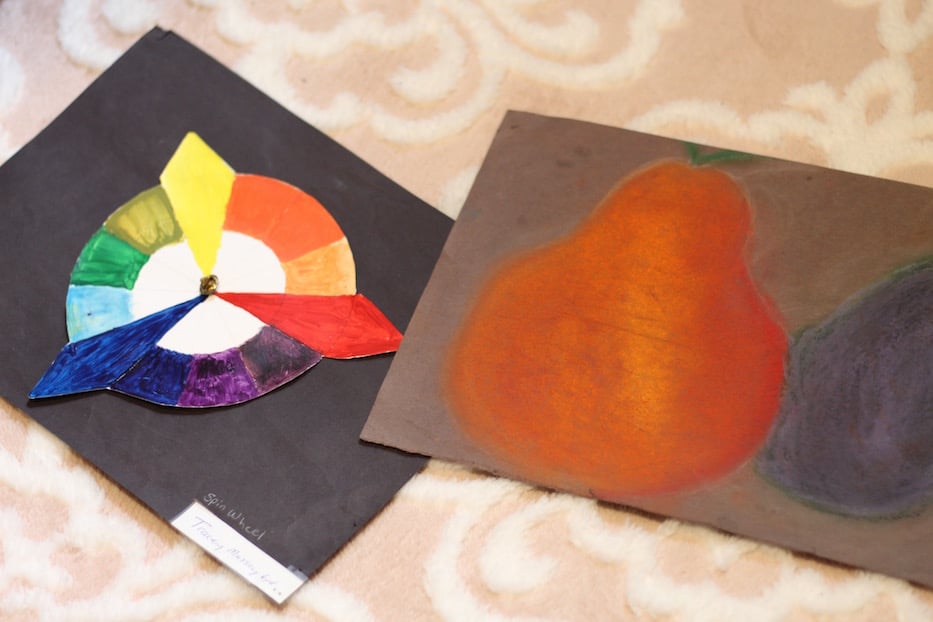
Massey has held onto works that she did as a student at Adult & Continuing Education.
Still, she held fast to the arts: she took her kids to local art galleries and museums, dance performances, and theaters. She signed them up for library cards when they were still in diapers and brought them downtown each summer for the International Festival of Arts & Ideas. The art bug rubbed off on them too: her son Sharod started making his own clothes as a kid. Her daughter Trayonna later started to make jewelry and is studying to become a hair stylist.
"When you're an artist or you love art, that's something you can never get away from," Massey said. "Even if you put a pause on it and you're not doing it. You're just attracted to it. Wherever it is, I have to be there. I have to see it. I have to be in the room. Even if I'm not doing it, I have to be a part of it. It does something to my soul, to my spirit."
In 2017, Massey went back to school at the New Haven Adult & Continuing Education Center, where she was able to finish her GED and graduate two years later. In her classes, she fell back in love with art, drawing in different media for the first time in years. She became a neighborhood ambassador at Long Wharf Theatre, where a performance of Pride & Prejudice brought her to tears.
Through the Yale Repertory Theatre’s former Will Power! Program, she soaked in performances of Cadillac Crew and Father Comes Home From The War before the pandemic hit New Haven. She said that she learns from every performance that she sees.
"So many of us are still living under masters,” she said of Father Comes Home, which traces a Black American family through the Civil War. “We’re never taught to be our own leader—so many of us are still trapped. And we have to find a way to free ourselves."
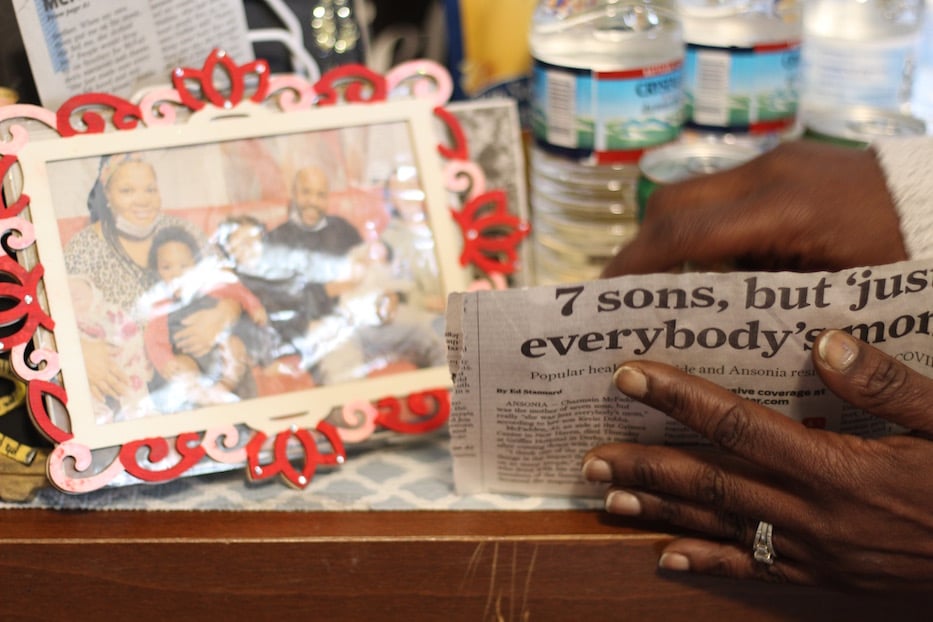
Massey has created a small place on her desk to remember Charmaine McFadden, a friend who died of Covid-19 in January of this year.
She started making time for her own art a few years ago, while still in classes at New Haven Adult Ed. Two years ago, she also joined the staff of the Music Notes Kids Club to teach art students at Ross-Woodward School over the summer, in a program called P.I.M.O.S.H. (People Involved in Motivating Our Students Higher). That work dried up when the pandemic swept through New Haven. She said that she is still working with the club to figure out what art classes might look like as the world begins to reopen.
During the day, Massey now works as a nanny to two kids, while plotting her next steps as an artist. At night, she steps into her studio for hours to work on her art. She is currently painting a series of ceramic angels and working on earrings and clothing designs that she can sell at craft fairs, as she did at a Juneteenth celebration last month. Inspired by the late Winfred Rembert, she has also started to tool leather.
She said that it helps her find inner peace. Prior to the pandemic, Massey lost several of her siblings. Then this year, her brother Kiwa, with whom she was especially close, passed away in March at the age of 56. She lost her niece to a heart attack in April.
She has been making painted boards, picture frames and three-dimensional collages to cope with the weight of Covid-19, including the loss of her close friend Charmaine McFadden, who died of the virus in January after picking it up at work. Often, she will work for hours alone. Sometimes, she said, her husband Michael will sit on the floor and color with her.
In her pieces, Massey has used pastels, paint, mixed fabrics and collage to tell a story of her grief—and how she moves beyond it. In the far corner of her studio, a painting of lovers peeks out, the two pressing their bodies into each other. She has kept pieces from Adult Ed: still lives of fruit and color wheels where squares of green, red and yellow are arranged beside each other. A painted motorcycle jacket hangs on the back of a door. By a window, an angel weeps in silver and blue.
"I'm still healing,” she said. “I'm healing and grieving at the same time. And what I learned to do, what's going on in the world with everybody else, I don't let it rile me anymore. That's what we supposed to do. Turn something beautiful into something even more beautiful. Take our pain and turn it into something that will make you happy."

